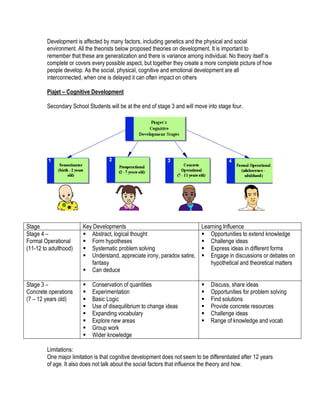
Theories of Development and Cognitive Stages
- 1. Development is affected by many factors, including genetics and the physical and social environment. All the theorists below proposed theories on development. It is important to remember that these are generalization and there is variance among individual. No theory itself is complete or covers every possible aspect, but together they create a more complete picture of how people develop. As the social, physical, cognitive and emotional development are all interconnected, when one is delayed it can often impact on others Piajet – Cognitive Development Secondary School Students will be at the end of stage 3 and will move into stage four. Stage Key Developments Learning Influence Stage 4 – Abstract, logical thought Opportunities to extend knowledge Formal Operational Form hypotheses Challenge ideas (11-12 to adulthood) Systematic problem solving Express ideas in different forms Understand, appreciate irony, paradox satire, Engage in discussions or debates on fantasy hypothetical and theoretical matters Can deduce Stage 3 – Conservation of quantities Discuss, share ideas Concrete operations Experimentation Opportunities for problem solving (7 – 12 years old) Basic Logic Find solutions Use of disequilibrium to change ideas Provide concrete resources Expanding vocabulary Challenge ideas Explore new areas Range of knowledge and vocab Group work Wider knowledge Limitations: One major limitation is that cognitive development does not seem to be differentiated after 12 years of age. It also does not talk about the social factors that influence the theory and how.
- 2. Vygotski - Social influences on cognitive development Idea: people learn from their interactions with others. Language, a social tool, can be used to develop cognitively, even if it is done in private. Children have a genetic propensity to learn, which is increased when they are given help. Impact on Learning: - Assessment needs to take in account what the student can do by himself and what he can do with help - Instruction needs to focus on what students need help to do - Students can learning from each other - Every person no matter, can develop and improve including those with disabilities - Build on prior knowledge by integrating it with new material - Put students in touch with experts that they can learn from (guest speakers, apprenticeships, internships) The implication of this approach would be that students could engage in inquiry and collaborative learning process starting from Year 7. My year 7s were fairly capable of doing this, but my Year 8s were unable. Thus, showing that this is an ideal-type generalization about the stage that students should be at. It’s possible that my students were at this, but were merely unmotivated. This means that students may have the cognitive ability, but do not necessarily produce assessments that reflect their cognitive ability for some other reason.
